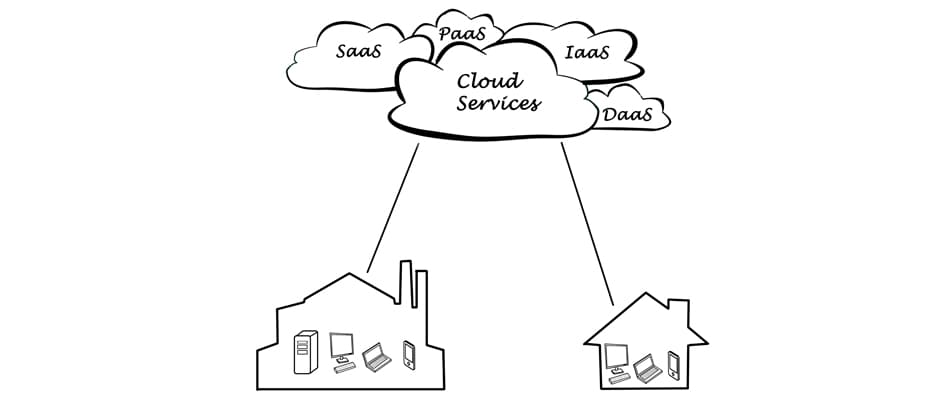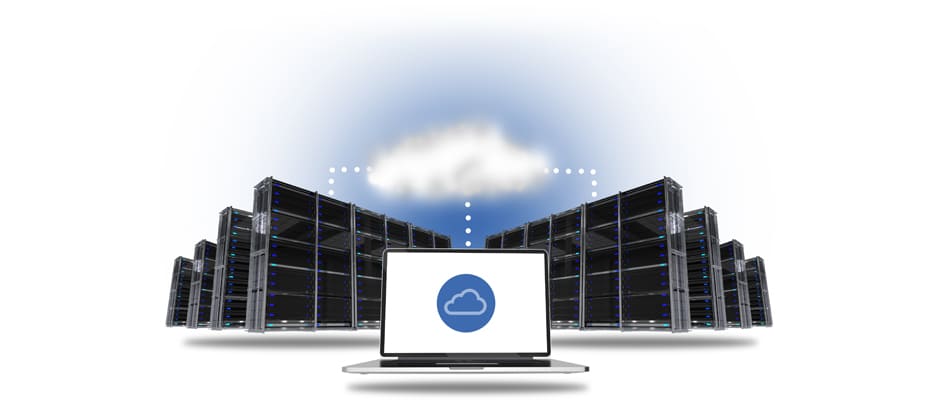Let's Talk !

The Untold Story of Two Powerhouses
By: Guarav Sharma
Oracle Software Development ServicesOracle Cloud is a set of branded Software as a Service (SaaS), Platform as a Service (PaaS), Database as a Service (DaaB), and Infrastructure as a Service (IaaS) offerings that are used to build, redistribute, integrate, and expand Oracle applications and database technology in the cloud. Oracle Cloud provides users with server, storage, and network services.
Here's where we're going if you want to jump ahead:
The advancement of technology, storage, and processing power has led to the embodiment of cloud computing and its expanding popularity across various industries for essential business support functions. The long and costly process of buying servers, installations, licenses, and hardware is now being replaced by newer more refined technologies that revolve around the cloud. Additionally, the growth of big data cloud computing and cloud data storage has been a huge facilitator in the rise of cloud computing.
Pivoting to the cloud can be a big challenge. That is why the platform you choose will be an important decision that will potentially affect short and long-term business goals. With the cloud computing market growing at an aggressive rate, vendors such as IBM, Google, Oracle, and Amazon have been catching up fast. Below we evaluate the two biggest players in the market, Oracle Cloud VS Amazon Web Services (AWS), to find a solution for your database administration environment needs.
Amazon has been a pioneer in cloud services for over a decade. When Amazon started back in 2006, their offering was only Infrastructure as a Service (IaaS). Amazon offered customers their storage space on a pay-as-you-go model. Now, they have evolved into a Data as a Service (DaaS) and Platform as a Service (PaaS) model.
Oracle, known for their software expertise and data processing prowess, has combined its forces with cloud computing capabilities and entered an arena that is rapidly gaining ground. Although Oracle is a late entrant, launching their first IaaS offering in 2015, it has brought a very robust infrastructure to compete with other market players.
Oracle Cloud is a cloud computing service that combines Infrastructure as a Service (IaaS), Software as a Service (SaaS), Platform as a Service (PaaS), and Data as a Service (DaaS) solutions within Oracle's cloud infrastructure.

Oracle Cloud is meant to deliver business users and developers with seamless workloads that meet server, storage, application, and network needs. The four Oracle Cloud services, branded under the Oracle name, are discussed below:
Oracle's IaaS solution enables users to build and run a comprehensive amount of applications and services in Oracle's hosted environment. Its services include:
Compute: Oracle provides customers with Virtual Machine instances that are made for varying levels of workloads and business performance (from single-core VMs to 52-core bare metal servers)
Storage: Oracle's IaaS offers block volume, archive storage, and object storage to suit application needs that come from small websites to larger more demanding enterprise applications.
Networking: Oracle offers customizable Virtual Cloud Networks (VCN), IP addresses, routing, and firewalls to support private networks with continuous security.
Database: With this service users get Real Application Cluster (RAC) reliability, data security, and granular controls all in one reliable cloud environment.
Containers: The IaaS platform delivers services based on support open source solutions that include Kubernetes and Dock for orchestration, management and more.
FastConnect: FastConnect gives users a private connection with higher bandwidth options.
Edge Services: This service provides outage management using a secure DNS infrastructure that enables users to optimize connection performance.
Security: This service offers clarity across public API activity, access management, and control over cloud resources.
Oracle's SaaS solution is known as Oracle Cloud Applications. These cloud based applications offer differentiated, industry-specific, products and services with varying deployment options for standardized functionality. The marketplace offers anything from adaptive intelligence to Internet of Things Applications. Oracle Cloud Applications provides a product portfolio meant to address different business needs among varying industry verticals.
The Oracle Cloud Platform gives users the ability to build, deploy, integrate, and extend applications in the cloud. Oracle leverages artificial intelligence with machine learning to provide organizations with autonomous based solutions. Below are the portfolio of Oracle Cloud Platform services available to businesses:
Data Management: This is a data management platform that consists of transaction processing, data warehouse, and autonomous no SQL database solutions. It is the first autonomous database in the market. Additionally it provides Oracle database, database backup, big data, big data cloud, Oracle Event Hub, MySQL, and Oracle Data Hub solutions.
Application Development: This is an open, standards-based and integrated application development platform meant for large scale organizations who want to build and manage mobile and API-first cloud applications. It provides support for container native, cloud native, and low code development. Some of the included services are autonomous Blockchain, AI platform, mobile and Chatbots, and Java among others.
Integration: This service offers adapters that support on premise and cloud databases. Features include API management, data migration, integration, and replication, and cloud services such as Data Cloud Integrator and GoldenGate Cloud Service among others.
Business Analytics: Oracle Business Analytics generates insight and analytics from data integration and reproduction. Services include Analytics Cloud, Business Intelligence, Data Visualization, and Essbase.
Security: The Oracle Cloud Platform Provides end-to-end security by monitoring hybrid cloud environment, IT governance, and compliance requirements. It includes SIEM, UEBA, CASB, and IDaaS solutions.
Management: Oracle Management Cloud is a suite of autonomous management services that leverages big data and machine learning to optimize operational processes such as Application Performance Monitoring, Log Analytics, and more.
Content and Experience: This solution is for omni-channel content, website and workflow management, integrated with Oracle's SaaS and on-premise solutions. It includes a content hub, WebCenter Portal Cloud, and DIVA Cloud.
This platform leverages external data with the help of Oracle ID Graph, giving users a cross channel consumer understanding meant for advertisers and businesses who want to thoroughly understand customers.
Amazon Web Services (AWS) is a cloud service provider offering Infrastructure as Service (IaaS) and Platform as a Service (PaaS) solutions. Amazon's cloud service offering provides users with server, networking, storage, remote computing, email, and security solutions. AWS is one of the biggest vendors in the cloud computing market, hosting prominent websites like Netflix and Instagram.

Amazon offers various options when it comes to cloud computing products, services, and tools. Each solution is meant to expand the AWS cloud environment based on specific business needs and requirements. Below we describe the most commonly used AWS services broken down into four different categories: storage, computing, databases, and tools:
Amazon Glacier: This solution is used for long-term archiving. It ensures that deep storage backup items are secure and safe, even though they are rarely used.
Amazon S3: Simple Storage Services (S3) offers boundless storage space through the web service interface. It is the most supported cloud storage available as other AWS services discussed here are able to read and write from S3. Additionally it makes web-scale computing uncomplicated for developers.
Amazon EBS: : Amazon's Elastic Block Store (EBS) provides block storage volumes for EC2 instances. It is preferred for storing persistent data and can vary in storage volume from 1GB to 1TB.
Amazon EC2: Amazon's Elastic Compute Cloud (EC2) provides users with resizable compute capacity so that users can launch as many virtual private servers as needed while maintaining security and networking features.
Amazon RedShift: This application acts as an internet hosting service and data warehousing product that helps users store and organize terabytes and petabytes of data.
Amazon DynamoDB: This is a fully managed NoSQL database service within AWS that allows for high scalability and flexibility, perfect for mobile, gaming, and ad tech solutions.
Amazon ElastiCache: This service is a fully managed in-memory cache service and data store ideal for high performance cases similar to those of DynamoDB.
Amazon RDS: Amazon's Relational Database Service (RDS) is a web service that is similar and applicable to MySQL and Oracle Database. It helps users run and configure relational databases in the cloud.
Amazon CloudWatch: CloudWatch enables users to monitor their cloud environment for visibility into CPU usage, network traffic, and disk reads among other things.
AWS IAM: AWS identity and Access Management (IAM) facilitates users to enable identity management capabilities and IT administration control for user access on various AWS resources.
Amazon CloudFormation: This platform allows users to set up several AWS services on the go with common language capability.
Amazon Elastic Beanstalk: This orchestration tool helps deploy and manage web applications, taking advantage of full capacity provisioning, load-balancing, and more.
Ensuring that your database needs are satisfied with the right cloud computing vendor is a crucial business decision. Considering that Oracle Cloud and Amazon Web Services (AWS) are one of the two biggest players in the market right now, we have narrowed down the key differences between each platform and detail them below:
When it comes to cloud infrastructure as a service and renting virtual spaces, pricing and payment models can be complex. But it should be clear that price will vary based on different instances and needs such as memory, CPU usage, and other specific configurations. In the case of Oracle, its current offering is a price cut to long time customers who already pay for licenses to applications like Middleware and database a discount if they choose to run their software in the cloud. Generally speaking, AWS is more affordable than Oracle Cloud.
Amazon Web Services (AWS) offers a pay-as-you-go fee model giving customers the control over how much services to add as they grow. For services such as Amazon EC2 and RDS, users can save money when they reserve. Investing in reserved capacity is equivalent to on-demand capacity, meaning the larger the upfront payment, the greater the discount.
Oracle Cloud also offers a pay-as-you-go model where laaS and PaaS services are metered hourly and charged only for the resource consumed, according to their website. Additionally, services for Oracle Cloud are billed at list price. Thankfully, both vendors offer an online calculator estimator where you can estimate cost savings and modify assumptions.
Oracle Cloud entered the market in 2015. Oracle had a very robust set of product offerings such as Oracle Enterprise Resource Planning, Oracle Enterprise Performance Management and more. The company established their expert presence in the field of software and software licensing solutions.
Amazon established and hosts some of the largest and notable public clouds like SAP Hana's cloud database, Netflix, and Instagram. The company entered the cloud computing market back in 2006, establishing multiple data centers across the world. They have established a large market presence where their experience serves as a significant competitive advantage.
Due to the large offerings both Oracle Cloud and AWS offer with their cloud solutions, their support relies on a wide network and variety of partners. Through their partner community, users are able to get customized solutions and support services based on specific industry and organizational needs.
The AWS Partner Network (APN) provides AWS-based businesses with technical, marketing, and go-to-market support. They give partners the resources and support to advance specific business needs.
The Oracle Partner Network (OPN) is very similar whereas it provides businesses with the actionable ability to make the move to cloud-based services. This network allows business to focus specifically on driving their Oracle Cloud solutions with implementation specialists and enablement resources.
The payment model for AWS allows for easy adaptability when business needs change and fluctuate. Organizations can pay for services on an as needed basis. When it comes to Oracle Cloud, users can also leverage flexibility depending on how often they need to rely on services.
Among the two competitors, it is important to determine which platform will best suit business needs. Whether its enterprise sized organizations or small startups, data and cloud computing needs are rapidly growing. Consider contacting us if you've made a decision.
Chetu provides Amazon Web Services (AWS) development and configuration on services such as Amazon cloud computing, Amazon storage, database management, migration solutions, networking and content delivery.
Additionally, we are certified Oracle Gold Partners. We provide full-cycle custom software development services for Oracle Cloud, Database, Middleware, Applications, and industry-specific Oracle solutions. Consult with an expert today.
Disclaimer:
Chetu does not affect the opinion of this article. Any mention of a specific software, company or individual does not constitute an endorsement from either party unless otherwise specified. This blog should not be construed as legal advice.
Founded in 2000, Chetu is a global offshore software development provider, offering solutions and support services. Chetu's specialized technology and industry experts serve startups, SMBs, and Fortune 500 companies with an unparalleled software delivery model suited to the needs of the client. Chetu's one-stop-shop model spans the entire software technology spectrum. Headquartered in Plantation, Florida, Chetu has fourteen locations throughout the U.S. and abroad.
Privacy Policy | Legal Policy | Careers | Sitemap | Referral | Contact Us
Copyright © 2000-2024 Chetu Inc. All Rights Reserved.
